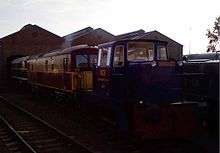Chasewater Railway
| Chasewater Railway | |
|---|---|
 The Chasewater Heaths station, with the new signal box rebuilt at the station in 2007 | |
| Locale | Brownhills West |
| Terminus |
Chasetown (Church Street) (north) Brownhills West (south) |
| Commercial operations | |
| Original gauge | 4 ft 8 1⁄2 in (1,435 mm) standard gauge |
| Preserved operations | |
| Operated by | Chasewater Light Railway & Museum Company |
| Stations | 4 |
| Length | 2 miles (3.2 km) |
| Preserved gauge | 4 ft 8 1⁄2 in (1,435 mm) standard gauge |
| Chasewater Railway | ||||||||||||||||||||||||||||||||||||||||||||
|---|---|---|---|---|---|---|---|---|---|---|---|---|---|---|---|---|---|---|---|---|---|---|---|---|---|---|---|---|---|---|---|---|---|---|---|---|---|---|---|---|---|---|---|---|
| ||||||||||||||||||||||||||||||||||||||||||||
The Chasewater Railway is a former colliery railway running round the shores of Chasewater in Staffordshire, England. It is now operated as a heritage railway.
The line is approximately 2 miles (3.2 km) in length, contained entirely within Chasewater Country Park. The route, which forms a horse-shoe shape around the lake, passes through heathland, including a Site of Special Scientific Interest, and passes over a 1⁄4 mile (0.40 km) long causeway.
History
Prior to preservation, the line was part of the network operated by the NCB to serve the coalfields of the Cannock Chase area. The exchange sidings, where the colliery line connected with the Midland Railway, were situated about 1⁄4 mile (0.40 km) north of the current Brownhills West Station.
Significant changes happened in 2002/2003 caused by the closure of the old Brownhills station, due to the building of the M6 Toll motorway. This led to the rebuilding of Brownhills West with significantly improved facilities, including a new carriage shed and heritage centre, and completion of the Chasetown section of the line (the 'Chasetown Extension Railway' between Chasewater Heaths and Chasetown Church Street).
In 2016 the Railway was awarded The Queens Award for Voluntary Services.
Stations
- Brownhills West
- Norton Lakeside Halt
- Chasewater Heaths (adjacent to Burntwood bypass)
- Chasetown Church Street
Rolling stock
The railway is home to a collection of steam and diesel locomotives of mostly industrial origin, many with local industrial connections. Passengers are conveyed in ex-DMU cars and British Railways Mark 1 coaches, as well as brake vans on gala days. In recent years the railway has also played host to various guest steam locomotives from other lines.
The railway also owns various vintage carriages, some dating back over a century. These, as well as other rolling stock, are accommodated in the newly completed Heritage Centre.
Locomotives
.jpg)

- Steam Locomotives
- Hawthorn Leslie 0-4-0ST No. 2780 "Asbestos" built in 1909 (On display).[1]
- W.G. Bagnall 0-4-0ST No. 2648 "Dunlop No. 6" built in 1940. (Operational, returned to service in 2017).
- W.G. Bagnall 0-4-0ST No. 2842 "Kent Electric Power Station No. 2" built in 1946. (Operational, on loan from the Foxfield Railway).
- Sentinel 0-4-0VBT No. 9632 built in 1957. (Under overhaul).
- Andrew Barclay 0-4-0ST No. 1223 "Colin McAndrew" built in 1911. (On display).
- Neilson 0-4-0ST No. 2937 "Alfred Paget" built in 1882. (In storage).
- Hudswell Clarke 0-6-0T No. S100 built in 1949. (Under restoration).
- Peckett and Sons 0-4-0ST No. 917 built in 1902. (In storage).
- Hudswell Clarke 0-6-0ST, No. 431 "Sheepbridge No. 15" built in 1895. (In storage)
- Hunslet 0-6-0ST No. 3783 "Darfield No. 1" built in 1953. (Under overhaul, currently in the guise of local engine "Holly Bank No. 3").
- Robert Stephenson and Hawthorns 0-6-0T No. 7684 "Nechells No. 4" built in 1951. (On display).
- Peckett and Sons 0-4-0ST No. 2012 "Teddy" built 1941. (On display)
- Diesel Locomotives
- North British Locomotive Company 0-4-0DH No. D2911 built in 1958. (Operational).
- BR Class 08 no D3249/08 359 built in 1958. (Operational).
- Baguley 0-4-0DM No. 3027 "Bass No. 5" built in 1939. (Operational).
- Baguley 0-4-0DM No. 3410 "Martson, Thompson and Evershed No. 4" built in 1955. (Operational).
- Baguley 0-4-0DM No. 3590 "Bass No. 11" built in 1962. (In storage).
- Fowler 0-4-0DH No. 4220015 "Toad" built in 1962. (In storage).
- Hunslet 0-4-0DH No. 6678 built in 1968. (Operational).
- Fowler 0-4-0DM No. 4100013 built in 1948. (In storage).
- Brush Bagnall 0-4-0DE No. 3097 built in 1956. (Under overhaul).
- Kent Construction and Eng Co. 4wDM No. 1612 Planet built in 1929. (Operational).
- Ruston 48 4wDM No. 305306 "Ryan" built in 1952. (Under restoration).
- F.C. Hibbard Planet 4wDM No. 1891 "Derbyshire Stone No. 2" built in 1934. (In storage).
- Bagnall 0-6-0DM No. 3119 "Hem Heath" built in 1956. (In storage).
- Bagnall 4wDH No. 3208 built in 1961. (In storage).
- Kent Construction and Eng Co. 4wDM No. 20 Planet built in 1926. (On long term loan to the National Brewery Museum).
- Robert Stephenson & Hawthorns 8366/Bagnall 0-4-0DH No. 530003, "Myfanwy" built in 1962. (Operational).[2]
- Thomas Hill 4wDH No. 01568 "Helen" built in 1976. (Operational).
- Simplex 0-4-0PM No. 15097 (works number 1930) built in 1919. (Operational).
- Simplex 0-4-0PM No. 15099 (works number 2028) "Morris" built in 1920. (Operational).
- Diesel Multiple Unit Centre Cars
Narrow gauge railway
.jpg)
Volunteers are currently working to establish a 2 ft (610 mm) gauge narrow gauge railway close to the heritage centre.
References
- ↑ "Asbestos Special 1st January 2012". Retrieved 12 February 2012.
- ↑ Industrial Railway Society (2009). Industrial Locomotives (15EL). Industrial Railway Society. ISBN 978-1-901556-53-7.
External links
| Wikimedia Commons has media related to Chasewater Railway. |